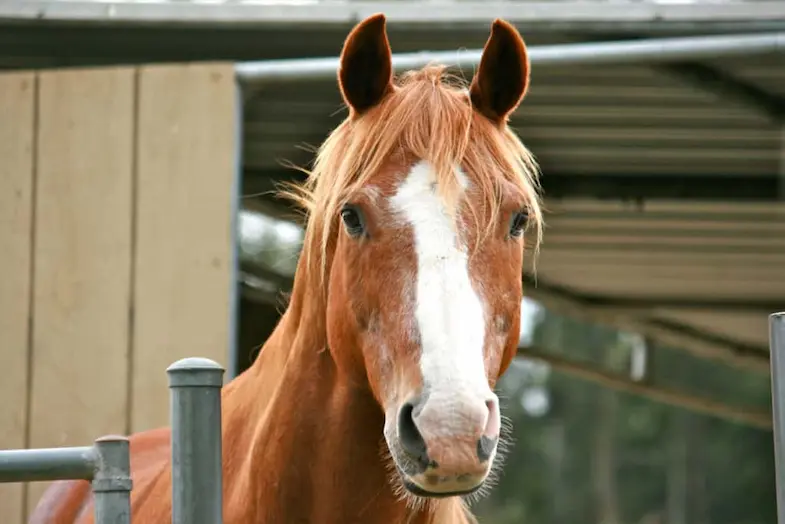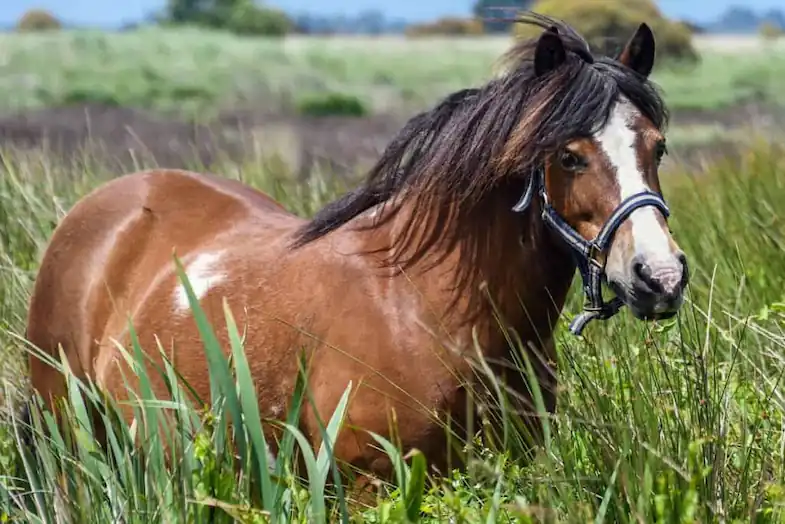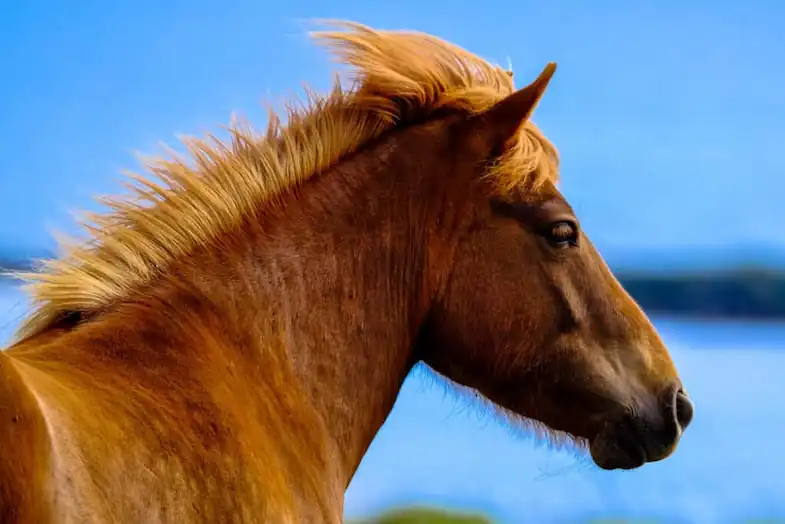I was talking to an old friend the other day about the different nicknames we all have for our horses and how some horses still respond to those names, no matter how obscure they are. This started me thinking about whether or not horses actually knew their names. I’m sure that many of us (me included) think that our horses understand what we’re saying to them but I wanted to find out for sure if this was the case so decided to carry out my own research into this.
Do horses know their own names? There’s no doubt that horses understand their names but not necessarily in the same way we do (or even that dogs understand). While horses can be trained to recognize their name, without training most horses will respond to the sounds you make or the tone of your voice instead.
It might sound silly to say that a horse is a horse and not a human but no matter how much we know this we can’t help but anthropomorphize, and expect them to have the same feelings that we do as well as understand exactly what we’re asking or saying. The same goes for their names, when we ask if they recognize their name we’re asking about whether or not they understand it in a human sense, for which the answer would always have to be no. If, however, you’re asking if a horse understands his name in a horse sense then the answer would clearly be yes.
So what does this actually mean? To put it simply a horse doesn’t understand the actual word you’re using, but what he does understand though is the sound you’re making, the tone you’re using as well as any visual cues. I recently put this to the test with some of my horses, I asked a few friends (some of them knew my horses while others didn’t) to call them all in from the field, I repeated this a few different ways and was quite surprised with the results.
- To start with I asked the friends who’d never met my horses to call them by their names, while one of the horses did twitch his ears none of them moved.
- Next, I got the friends who knew my horses to call them, not by their names but by similar-sounding names (or words), this time all but one of the horses responded.
- Next, I tried calling them myself while they were out of sight, some of the horses did respond but the results were very mixed.
- I repeated it again but this time when I could see them all and every single one of them responded.
- Finally, I asked all of my friends (at different times) to shake a bucket with some treats in but to not call the horses, unsurprisingly they all came running!
While this is by no means conclusive it does show that it’s not the name the horse is responding to but more the sound and the tone of the person calling them. This can be extrapolated further to say that if you say something nasty to a horse in a nice, gentle, and calming tone they’ll respond favorably whereas if you say nice things to a horse in an aggressive manner you’ll get the opposite reaction.
Just because a horse doesn’t know its name in a human sense it doesn’t mean that it doesn’t recognize its name at all. This is especially true of driving horses or those that work in a team, each horse has to know its own name (without any visual cues) and respond to the following command, if they didn’t then all of the horses would all be trying to do the same thing at the same time – it would be chaos.
Can you change a horse’s name?
The question of whether or not you should (or can) change a horse’s name is an age-old question that can often spark a heated debate with both sides arguing their right. While there’s definitely a valid argument for either case I know I wouldn’t like it if everyone decided to call me by a different name but that doesn’t mean to say its wrong for our horses, after all, we all have loads of nicknames for them (some more colorful than others!).
I know that some people don’t like to change their horse’s name, thinking it might be bad luck to do so, but in my opinion at least, there’s nothing wrong at all with changing their name. If you’re changing your horse’s name to a completely different one (such as from Bomber to Tornado) then it’ll take time for him to get to know and understand his new name, but if you’re changing your horse’s name to something similar (like changing Jack to Mac) then it’s more of an evolution than a change so he’ll probably not notice the difference.
When I was younger one of my friends bought a horse called Daphne but thought she looked like a cow (she was black and white) so changed her name to Daisy. She responded to her new name immediately, although later it turned out that her previous owners had decided to change her name to Daphne because they didn’t like her original name – which happened to be Daisy. So her current name change wasn’t actually a change after all and she clearly hadn’t forgotten her name.
How long does a horse take to learn its name?
To some extent this is one of those questions that can’t really be answered definitively, after all, all horses are different and learn at different speeds. Some can learn their name (or new name) within a few days while others may take weeks or even longer.
The reason it seems like most horses take a long time to learn their name is due to the way we train them (or in most cases don’t). When training a horse we often use single word verbal cues, such as walk, trot, whoa, etc but we rarely do this with their names. Instead, we expect them to learn their name just by using it a lot but while this will work with us it doesn’t with horses. We often mention their name mid-sentence with a lot of other words on either side of the ‘cue’ word. This, in most cases, leads to the horse being confused and not understanding what you’re saying. The best (and quickest) way to get your horse to know his name is to train him to do so.
There are two things to consider when using the same bit for multiple horses, the fit of the bit and any health issues the horse has. When it comes to the fit, it’s crucial that it’s right for both horses and doesn’t pinch at all. That said though if one of the horses has a contagious health issue they will pass it on to other horses using the same mouthpiece. With this in mind, you can use the same bit but it’s not advisable.
Is it bad luck to change a horse’s name?
Some people will say that it’s bad luck to change a horse’s name but, just as is the case with many other superstitions, there’s no evidence that changing their name will bring you good or bad luck. The assumption that it’s bad luck most likely came from the show ring or competition arena where a rider broke a running streak after changing their horse’s name.
Do horses know their owners?
There’s no doubt that horses recognize their owners, it’s part of their survival instincts to remember who’s good and who’s likely to be a threat. In fact, recent studies (carried out over a period of many years) have shown that horses remember people in the same way that they remember other horses and that these memories are built up over past experiences and memories.
Further reading
- Best horse names, ever
- How horses show affection
- How smart are horses?
- Equine vision: how horses see
- How hard do horses kick?
- Can horses find their way home?
I hope you found this article helpful. If you did I’d be grateful if you could share it please as it would really help me.
Recommended products
Over the years I have tried hundreds of different horsey products, from various blankets and halters to different treats. Some I’ve loved, others I’ve hated but I thought I’d share with you my top all-time favorite products, the ones I never leave the yard without. I’ve included links to the products (which are in no particular order) that I really think are great.
- Horse Knots by Reference Ready – If you’re like me and enjoy pocket reference guides then you’ll love this knot tying guide. These handy cards can easily fit in your pocket or attach to the saddle for quick reference. They’re waterproof, durable and are color coded to make them easy to follow.
- Mane ’n Tail Detangler – Even if you never show your horse you’ll need to detangle his tail from time to time (and possibly his mane too) which is always a challenging chore! I’ve found that if I run a little bit of detangler through my horse’s tails every few days it stops them from getting matted up and makes combing them easy, even if they’re coated in mud. I don’t know if I should admit to this or not but it also works wonders on my hair.
- TAKEKIT Pro clippers – Over the years I’ve tried a lot of different clippers and while some were obviously better than others I found these to be by far the best. They are heavier than a lot of other clippers but for me, that’s a good thing, it makes them feel more sturdy and hardwearing. On top of that they have a range of speeds so are just as good for clipping your horse’s back as they are his face. I also like the fact that they come in a handy carry case but that’s not for everybody. The company that makes them is super good and incredibly helpful too, a real bonus these days. The only thing I wasn’t keen on was the fact that it doesn’t come with any oil, but that’s not a major problem as it’s not difficult to buy lubricant.
- Shire’s ball feeder – There are so many boredom buster toys out there but I like to use these every day, regardless of whether or not my horses are bored. I find that it helps to encourage my horses to problem solve by rewarding them with treats (or pieces of fruit) but it also mimics their natural grazing behavior which helps to keep them calm and de-stressed.
- Horse safe mirror – This is a strange one that many people are surprised about but I like to put horse safe mirrors in the trailers as well as in the quarantine stalls. It helps to prevent the feeling of isolation by giving the impression of other horses being around. Being herd animals horses can get extremely stressed when they feel that they’re on their own but with these stick-on mirrors, they believe that at least one other horse is with them.
- Rectal thermometer – I know this isn’t glamourous at all but it’s vital for your horse’s well-being to be able to check their temperature and a rectal thermometer is the easiest way of doing this which is why I’ve added it to the list.
Shopping lists
I’ve also put together a few shopping lists of essential items that I’ve found helpful over the years. I’ve broken the lists down into different categories rather than put everything in one massive list 😉




